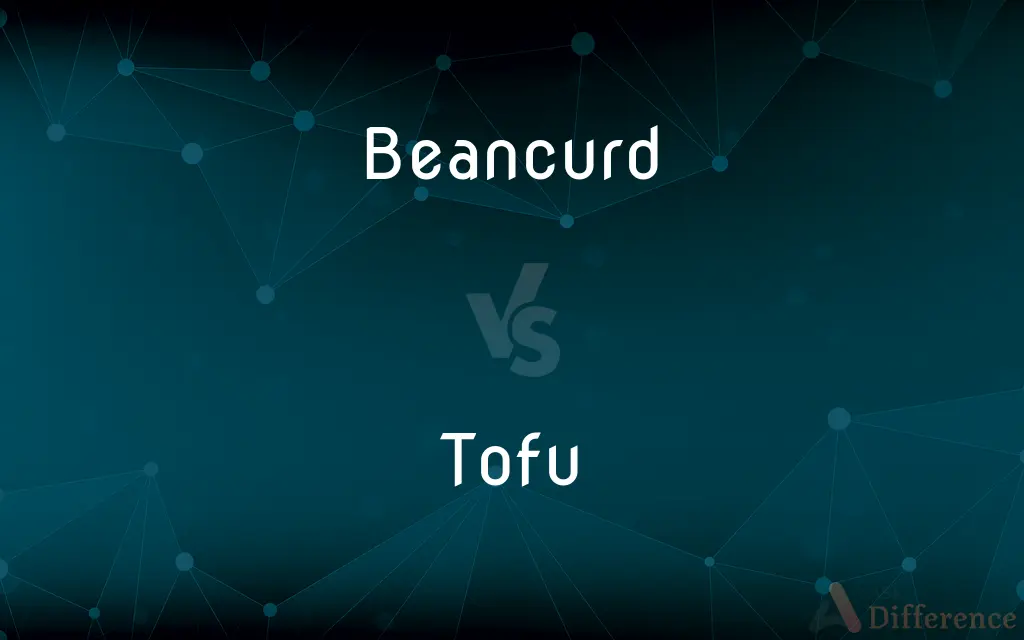Beancurd vs. Tofu — What's the Difference?
By Urooj Arif & Maham Liaqat — Updated on April 16, 2024
Beancurd and tofu refer to the same food product made from coagulated soy milk, pressed into solid white blocks used in various cuisines.

Difference Between Beancurd and Tofu
Table of Contents
ADVERTISEMENT
Key Differences
Beancurd, commonly known as tofu in many parts of the world, is a food made by coagulating soy milk and then pressing the resulting curds into solid blocks. This versatile ingredient is integral to many Asian cuisines and is celebrated for its ability to absorb flavors from other ingredients.
While the term "beancurd" is often used in British English and certain Asian regions, "tofu" is the more commonly recognized name in American English and globally. Both terms describe the same product and can be used interchangeably.
Beancurd (tofu) comes in various textures, ranging from soft and silken to firm and extra firm, each suited for different culinary uses. Soft beancurd is ideal for soups and desserts, whereas firm tofu is best for frying and grilling.
Beancurd is a valuable plant-based protein source, low in calories but high in protein and iron, making it a popular choice among vegetarians and vegans alike.
The production of beancurd involves curdling soy milk with a coagulant such as magnesium chloride or calcium sulfate, then pressing the curds into molds to form blocks. This process highlights the simplicity and natural origin of tofu.
ADVERTISEMENT
Comparison Chart
Terminology
Often used in British English and Asia
Common term in American English and globally
Texture Varieties
Silken, soft, firm, extra firm
Silken, soft, firm, extra firm
Culinary Uses
Soups, desserts, stir-fries, grilled dishes
Soups, desserts, stir-fries, grilled dishes
Nutritional Content
High in protein, low in calories
High in protein, low in calories
Production Process
Coagulated soy milk, pressed into blocks
Coagulated soy milk, pressed into blocks
Compare with Definitions
Beancurd
Also known as tofu, it is a staple in many Asian cuisines.
She prepared a spicy Sichuan beancurd dish for dinner.
Tofu
Comes in different firmness levels to suit various recipes.
Firm tofu is excellent for making crispy tofu bites.
Beancurd
A rich source of plant-based protein and iron.
He included beancurd in his diet to increase his protein intake.
Tofu
An essential ingredient for healthy, plant-based diets.
Tofu is a staple in her vegan meal prep.
Beancurd
It absorbs flavors well, making it versatile in cooking.
The beancurd absorbed all the flavors of the marinade beautifully.
Tofu
Used in various dishes, from breakfast to desserts.
She used silken tofu to make a smooth pudding.
Beancurd
A food product made from coagulated soy milk, pressed into blocks.
Beancurd is often used as a meat substitute in vegetarian dishes.
Tofu
Known for its ability to take on the flavors of other ingredients.
The tofu perfectly absorbed the barbecue sauce.
Beancurd
Available in various textures for different cooking methods.
For her soup, she preferred using soft beancurd.
Tofu
A popular term for beancurd, especially in the U.S. and international markets.
Tofu scrambles are a popular vegan breakfast option.
Beancurd
Alternative spelling of bean curd
Tofu
Tofu, also known as bean curd, is a food prepared by coagulating soy milk and then pressing the resulting curds into solid white blocks of varying softness; it can be silken, soft, firm, extra firm or super firm. Beyond these broad textural categories, there are many varieties of tofu.
Tofu
A protein-rich food coagulated from an extract of soybeans.
Tofu
A protein-rich food made from curdled soy milk.
Tofu
A box or rectangle, empty or with a question mark or hexadecimal code inside, displayed by some systems in place of a character not supported by available fonts. 1=such as □ or
Tofu
Cheeselike food made of curdled soybean milk
Common Curiosities
Can beancurd be eaten raw?
Yes, beancurd can be eaten raw and is often added to salads and cold dishes.
How should tofu be stored?
Tofu should be stored in water in a refrigerated container and the water should be changed daily.
Is there a difference between beancurd and tofu?
No, beancurd and tofu refer to the same product, though the term used may vary by region.
What is beancurd made of?
Beancurd is made from soy milk that has been coagulated and then pressed into blocks.
What are the health benefits of eating beancurd?
Beancurd is low in calories, high in protein, and contains beneficial iron and calcium.
How is tofu made?
Tofu is made by coagulating soy milk and pressing the curds into blocks.
Can beancurd be used in desserts?
Yes, soft or silken beancurd is excellent in desserts like puddings or smoothies.
Which type of tofu is best for frying?
Firm or extra firm tofu is best for frying as it holds its shape well.
Are there any allergens in tofu?
Tofu contains soy, which is a common allergen.
Is tofu suitable for a keto diet?
Yes, tofu is suitable for a keto diet as it is low in carbohydrates.
What coagulants are used in tofu production?
Common coagulants include magnesium chloride (nigari) and calcium sulfate.
What dishes can I make with extra firm tofu?
Extra firm tofu is ideal for grilling, baking, and stir-frying.
How long does tofu last in the fridge?
Tofu can last up to a week in the fridge if stored properly in water.
Can tofu be frozen?
Yes, freezing tofu changes its texture, making it chewier and more suitable for some dishes.
How do I make tofu taste better?
Marinating tofu or cooking it with strong flavors can help it absorb more taste.
Share Your Discovery

Previous Comparison
Throughput vs. Capacity
Next Comparison
Unsalable vs. UnsaleableAuthor Spotlight
Written by
Urooj ArifUrooj is a skilled content writer at Ask Difference, known for her exceptional ability to simplify complex topics into engaging and informative content. With a passion for research and a flair for clear, concise writing, she consistently delivers articles that resonate with our diverse audience.
Co-written by
Maham Liaqat













































